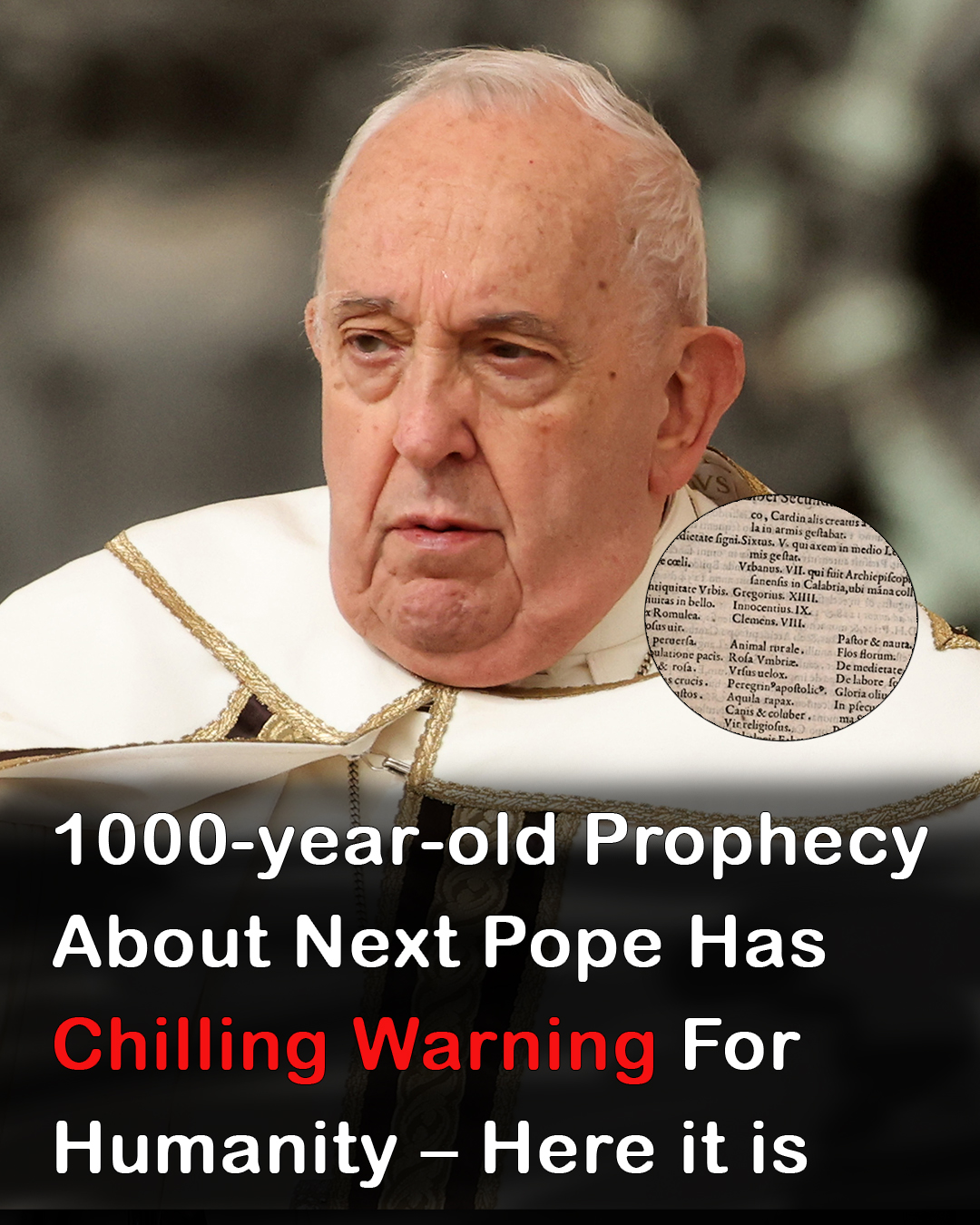In the wake of the passing of Pope Francis, a centuries-old prophecy has sparked a renewed interest across the internet, despite its controversial and eerie predictions. The prophecy, believed to have been written over 1,000 years ago by Saint Malachy, foretells not only the fate of future popes but also ominous predictions about the world’s end. This article delves into the chilling prophecy, its connection to Pope Francis, and the speculation surrounding his successor.
The Prophecy of the Popes: A Mysterious Prediction
The Prophecy of the Popes, which has circulated for centuries, is attributed to Saint Malachy, an Archbishop of Armagh, Ireland. Written in the 12th century, the prophecy allegedly predicts the reign of 112 popes, with Pope Francis being the penultimate pope on the list. The prophecy’s final prediction suggests that the last pope will preside over a time of great tribulations, and the “City of Seven Hills” (Rome) will face destruction.
This prophecy has drawn attention, especially in light of Pope Francis’ death on April 21, 2025, due to a cerebral stroke that led to heart failure. The timing of the prophecy’s prediction about the final pope and the fate of the world has left many questioning whether this could be a foreshadowing of significant events to come.
 VATICAN CITY, VATICAN – MARCH 31: (EDITOR’S NOTE: Alternative crop of image #2126955902) Pope Francis presides over the Easter Mass at St. Peter’s Square on March 31, 2024 in Vatican City, Vatican. (Photo by Franco Origlia/Getty Images)
VATICAN CITY, VATICAN – MARCH 31: (EDITOR’S NOTE: Alternative crop of image #2126955902) Pope Francis presides over the Easter Mass at St. Peter’s Square on March 31, 2024 in Vatican City, Vatican. (Photo by Franco Origlia/Getty Images)
Pope Francis and the Prophecy’s Final Warning
The Prophecy of the Popes claims that the last pope will be “Peter the Roman”, who will shepherd the faithful during times of great difficulty. According to the prophecy, this pope’s reign will be followed by the destruction of Rome and the final judgment.
The name “Peter the Roman” has intrigued many, as Pope Francis chose his papal name in honor of Saint Francis of Assisi, whose father was named Pietro (Peter). While the connection between Pope Francis and “Peter the Roman” may seem tenuous, some supporters of the prophecy point to this link as confirmation of its accuracy.
More alarming is the interpretation that suggests Pope Francis’ papacy could signal the end of the world. According to some interpretations, the prophecy hints that the final events leading to the end times could occur as early as 2027. This forecast raises questions about the future of the Catholic Church and the world’s fate in the coming years.
A World in Turmoil: Does the Prophecy Hold Truth?
Given the current state of global turmoil, the prophecy’s prediction seems to resonate with some individuals. Issues such as political instability, economic crises, and environmental challenges are fueling the debate over whether the world is indeed heading towards an uncertain future. Some believe that the prophecy’s mention of “tribulations” and the eventual destruction of Rome might be symbolic of the global challenges that could lead to a significant shift in history.
However, it’s important to approach this prophecy with caution. Critics argue that the Prophecy of the Popes is a medieval document subject to misinterpretation. Josh Canning, director of the Chaplaincy at Toronto’s Newman Centre, dismissed the prophecy in 2013, stating, “I don’t know how you can connect Peter the Roman with Pope Francis.” His comment reflects the skepticism many have toward such predictions and premonitions.
 Credit / Public Domain
Credit / Public Domain
The Path to Choosing a New Pope
The passing of Pope Francis has set in motion the process of choosing his successor, a task that is always fraught with significance. While the papal selection process can take time, the world’s eyes are now fixed on the Vatican as it prepares for the election of the next pope. The conclave of cardinals will play a crucial role in selecting a leader who will guide the Catholic Church during what may be a period of global change.
The Role of Faith in the Future of the Church
In the aftermath of Pope Francis’ death and the speculations surrounding the Prophecy of the Popes, many are turning to their faith to understand the potential future of the Church. Whether or not the prophecy holds any truth, the Church remains a pillar of support for millions of people worldwide.
As the world watches the events unfold, it is essential to recognize that the true strength of the Church lies not in predictions or prophecies, but in its commitment to faith, compassion, and the spiritual guidance it provides to its followers. The Catholic Church will continue to play a pivotal role in guiding millions through times of uncertainty, regardless of what may lie ahead.
A Time for Reflection: Preparing for the Next Pope
As the Vatican prepares for the election of the next pope, many are reflecting on Pope Francis’ legacy. His papacy was marked by compassion, humility, and a strong focus on social justice. As his successor is chosen, the Church faces the challenge of continuing this important work while addressing the many challenges of the modern world.
For those who are concerned about the future of the Church and the world, it’s a time to reflect on what truly matters: faith, community, and the ongoing work to promote peace, understanding, and love across the globe.
Conclusion: Preparing for the Unknown
While the Prophecy of the Popes has intrigued many, it’s essential to approach such predictions with skepticism. Pope Francis’ passing serves as a reminder that life is unpredictable, and the future is uncertain. As we await the election of a new pope, we must focus on what is in our control: supporting each other, fostering understanding, and embracing our shared humanity.
For more insights into maintaining emotional recovery and well-being, consider reading the following articles:
- 10 Signs You’re Eating Too Much Sugar
- 7 Words Depressed People Use More Often: How to Recognize the Signs and Offer Support
These resources offer valuable guidance on mental health and recovery, helping you navigate life’s challenges with resilience and hope.



